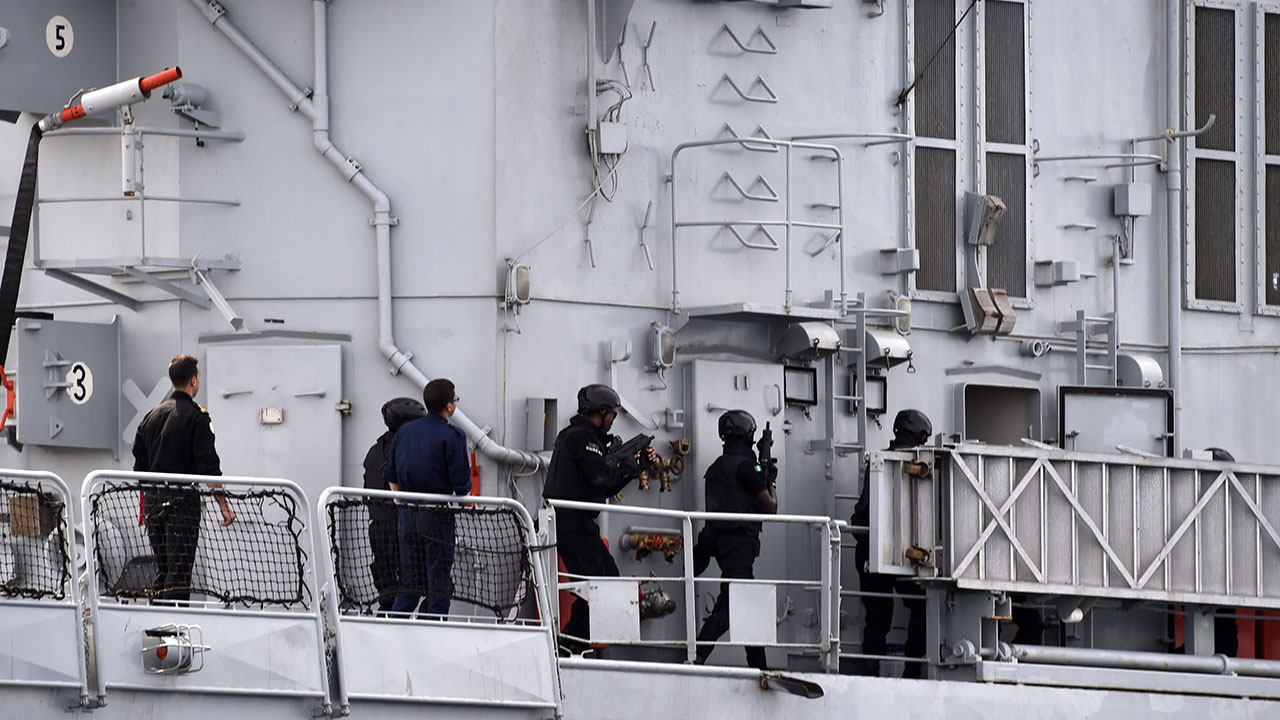
After the one week experience at sea, the United States Navy summed up its participation in two steps: “Gather information and pass it to the right people.”
Obangame Express is one of three annual U.S. Naval Forces Europe-Africa facilitated exercises and is part of a comprehensive strategy by U.S. 6th Fleet and U.S. Africa Command to provide collaborative opportunities among African forces and international partners to address maritime security concerns.
If the onslaught against armed robbers and other criminals has proved difficult, the war against sea pirates, oil thieves and illegal fishing activities can best be described as doubly difficult.
While the former count their criminal proceeds in millions of naira, the latter’s single haul could be in billions, enough to bring a nation to its knees economically.
Fighting pirates and oil thieves is not a tea party anywhere in the world. They are cartels operating in groups with extensive capital investment like the drug cartels. They are vast in the crime and international laws governing operations in the maritime domain as well as the limitations of law enforcement agencies in the maritime sector.
As a result, no single nation can successfully fight these criminals without international collaborative efforts. In the past, navies of the world had relied on their strength alone to patrol their waterways but with the successes gained from partnerships in past exercises, they are beginning to have a rethink.
No fewer than 30 vessels were seized by the Nigerian Navy in 2018 for various maritime crimes on the waterways, according to the Chief of the Naval Staff, Vice Admiral Ibok-Ete Ibas. Ibas said the number of vessels arrested in 2018 was lower than the 37 and 45 arrests recorded in 2016 and 2017 respectively.
“Within the past three years, over 80 errant vessels have been arrested for various acts of illegality. MT TECNE and MT NIPAL were caught in the act of stealing crude oil from the crude oil loading facilities in 2017 and 2018 respectively.”
He added that the Nigerian Navy, as at December 2018, handed over 247 maritime crime cases to prosecuting agencies such as the Economic and Financial Crimes Commission (EFCC) and the Nigerian Security and Civil Defence Corps (NSCDC) of which 51 had been successfully prosecuted.
Acknowledging the worsening security situation in the Gulf of Guinea, Ibas noted that there is collaboration between the navy and maritime stakeholders in the country and regional forces to addressing the issues.
The Nigerian Navy led by the Chief of Naval Staff (CNS) was part of a large team for the 2019 international maritime ‘show of force’, which had 31 participating countries from Africa, United States and Europe, tagged Exercise Obangame Express, a Cameroonian word for ‘Togetherness’.
The patrol of the waters kicked off on March 15, with NNS Centenary and NNS Unity patrolling the Gulf of Guinea (GoG) with newsmen for five days and five nights without berthing. The vessel and other participating vessels berthed on March 20, at naval dockyard, Victoria Island to mark the end of the event.
At a briefing before the sail, the Flag Officer Commanding (FOC), Western Naval Command (WNC), Rear Admiral Obed Ngalabak, disclosed that the navy was hosting 20 African nations and 11 allied countries, stressing that the exercise was aimed at assessing and improving GoG law enforcement capacity, promoting national and regional security, improving knowledge of African Maritime Law Enforcement Partnership (AMLEP) planning and operations, and shaping security force assistance efforts.
Delivering the welcome remarks, United States Consul General, John Bray, noted that Obangame Express had grown in leaps and bounds, both in complexity and in accomplishment.
He said: “We note the efforts by regional navies to work together in the spirit of the Yaoundé Code of Conduct, which is designed to improve regional cooperation, maritime domain awareness, information-sharing practices, and tactical interdiction expertise to enhance the collective capabilities of Gulf of Guinea and West African nations to counter sea-based illicit activity.”
Also, Bray and Ibas commissioned the Nigerian Navy’s Maritime Domain Awareness (MDA) Training School in Apapa.
The training school was built by the Nigerian Navy and equipped by the United States Navy.
[ad unit=2]



